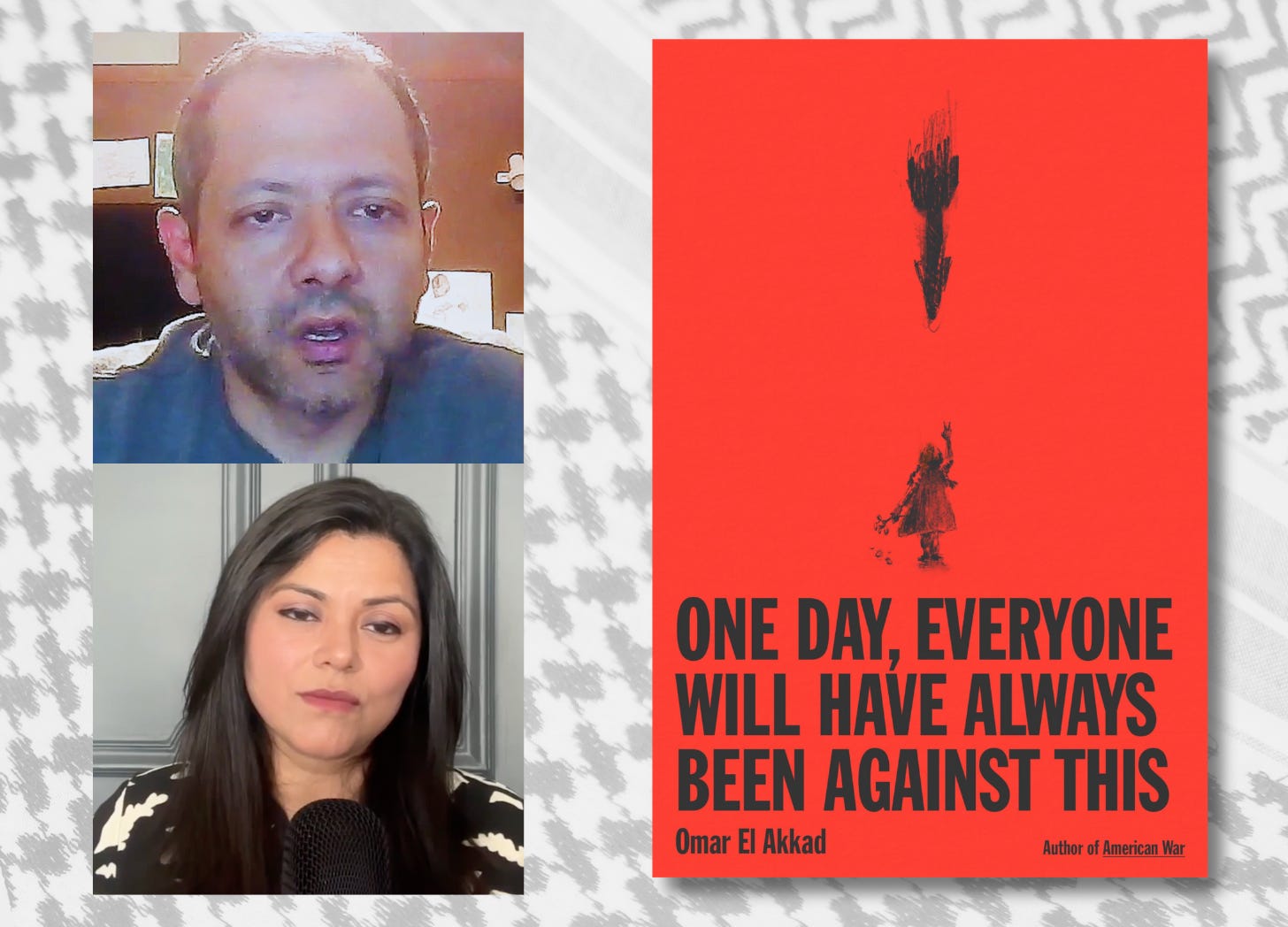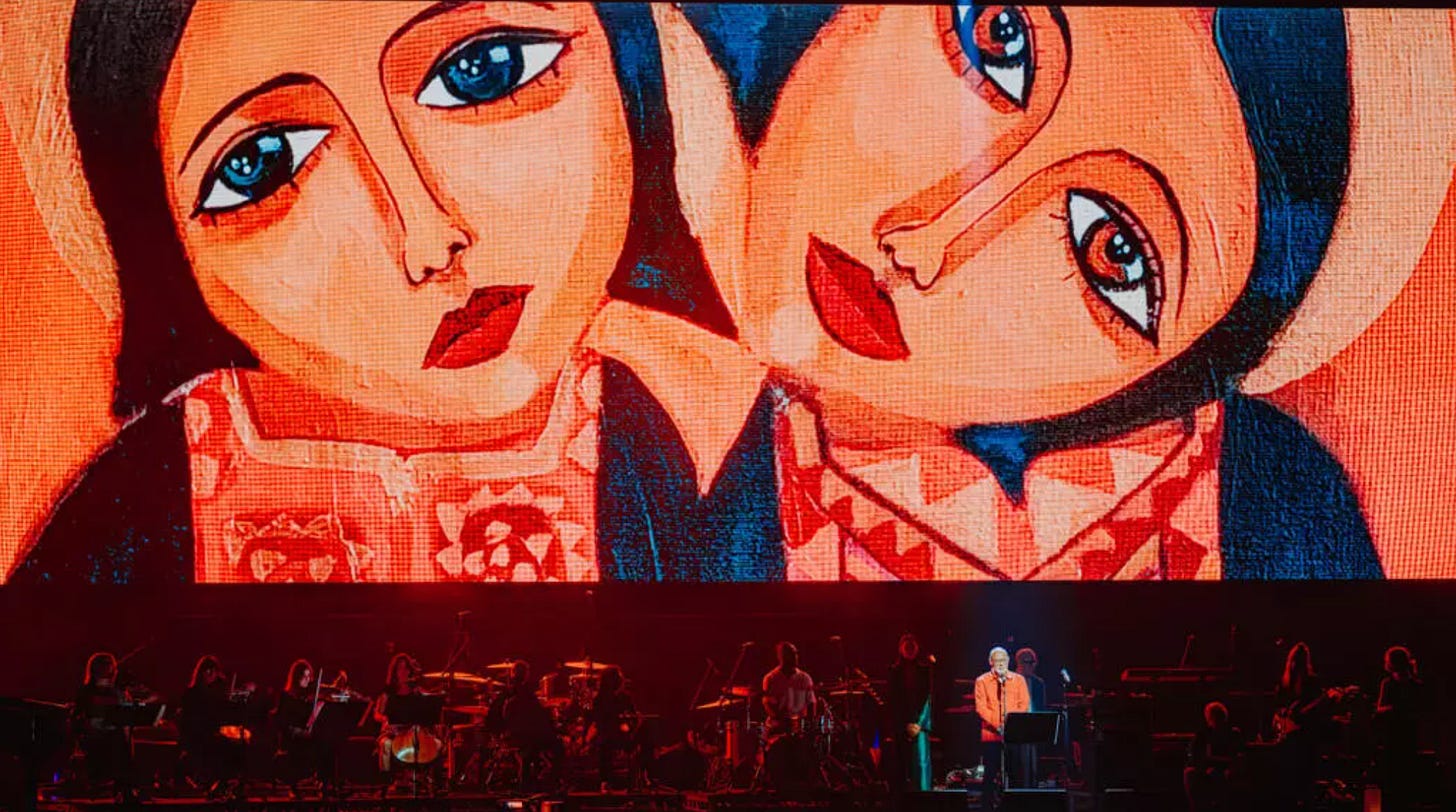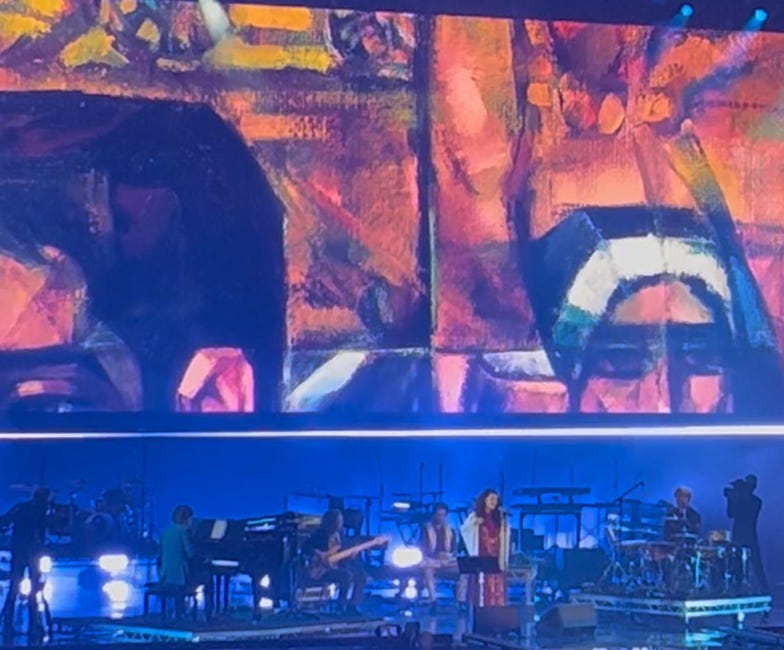Why the World Just Won’t Stop a Genocide.
By Bhakti Shringarpure. A conversation with writer Omar El Akkad, a massive solidarity concert for Palestine in London and seeking the smallest of signs that the tide may be turning for Palestine.
September has been a cruel month - an unpredictable emotional rollercoaster as signs that the tide might be turning for Palestine appear, but then disappear. After two years, we have become conditioned to a colonial logic so unvarying it appears almost scientific: for every good action, there is an opposite and horrifically disproportionate reaction.
Earlier this month, a film about Hind Rajab was backed by powerful Hollywood celebrities and received a standing ovation at a film festival. Hind, a little girl only a few months shy of six years old, was trapped in a car with her family members right next to an Israeli tank that kept firing at them. The family was on an emergency phone call to the Palestine Red Crescent Society for hours, begging to be rescued. The PRCS ambulance could not move because it had the red lasers of Israeli soldiers targeting it. As dusk fell, all six of Hind’s family members were dead, their corpses heaped onto her lap, her dress drenched in their blood. All alone now and in the dark, the call kept going.1 The transcript of her terrified pleas and eventual screams as she was gunned down, too, was published by PCRS and has become the subject of the acclaimed docudrama, The Voice of Hind Rajab, directed by Kaouther Ben Hania.
Despite the jarring image of a standing ovation by glamorous men and women in a glitzy auditorium for a tiny, terrified little girl murdered by 335 bullets, it felt that perhaps now, perhaps finally, a mainstream consciousness about the genocide is emerging.
That same week, the US Treasury Department imposed sanctions on three prolific Palestinian human rights groups: Palestinian Centre for Human Rights (PCHR), Al Haq and Al Mezan. This causes these groups’ bank accounts to be frozen, their movements severely restricted, their communications surveilled, and most importantly, their resilient reporting from the ground in Palestine to come to a halt. Former UN human rights lawyer Craig Mokhiber reminded everyone that “these are groups admired around the world for their professionalism, humanity and courage,” and these are acts of “blatant lawlessness” on the part of the Trump Administration are meant to terrorize these fierce human rights advocates into silence.
A week later, some more famous and influential people spoke out for Palestine with clarity and courage. Actor Javier Bardem brought attention to the film industry’s boycott of the Israeli film institutions and funders, a pledge signed by over 4000 industry workers. Queer Jewish actor Hannah Einbinder also spoke up for Palestine at an awards ceremony. Israeli orchestral conductor Ilan Volvok called for an end to the atrocities in Gaza at the Royal Albert Hall in London, and kept speaking passionately even as vile chants were hurled at him from across the auditorium.
During those exact few days, Israel bombed Qatar, adding to an international rampage that now includes Syria, Tunisia, Yemen, Iran and Lebanon, in addition to Palestine. In Tulkarem in the West Bank, brutal forms of collective punishment were enacted as a video circulated of a mass arrest of hundreds of men.2
This past week, Michael Bronner and I went to London to attend the Together for Palestine concert at the Wembley Arena. It was an unprecedented gathering that drew inspiration and courage from a previous such event in 1988, a concert for Nelson Mandela 70th birthday.3 Back then, Mandela had been labeled a “terrorist” and the BBC was nervous to broadcast the Mandela concert live, but relented eventually. This time around, there was no industry coverage at all - no broadcast of the the star-studded line of celebrity entertainers that took the stage, or the over 12,000 people who packed the concert hall. The list was long and it was heartening to see: Brian Eno, Riz Ahmed, Richard Gere, Guy Pearce, Elyanna, James Blade, Nai Barghouti, Benedict Cumberbatch, the London Arab Orchestra, Florence Pugh, Yasiin Bey, Neneh Cherry and dozens more. Emotions were high as appearances by Francesca Albanese, Malek Mattar, Dr. Ghassan Abu Sittah, Mehdi Hassan, Eric Cantona and several others drew attention to the slain Palestinian medical workers, slain artists, slain humanitarians, slain journalists, slain athletes, slain men, slain women, and the most wrenching of them all, the slain babies and children in Palestine.
We danced through our tears and clapped till our hands were sore. At the end of the evening, actor and activist Khalid Abdalla declared: “The silence of the past is gone.”4 A future came into view as he said those words.
But as we left the arena, news of Israel’s latest, furious ground offensive lit up our screens. The assault had ramped up, the slaughter had begun in even more earnest, the bombs were falling, and displaced Palestinians were once again seen on a death march. There was a telecoms blackout, and news was meagre. The silence was back.
This is the cruel, colonial ratio at work. The cumulative effect is one of whiplash. The uneven, emotionally draining developments I write about are only from the last few weeks. How are we even meant to put into words the savagery of the last two years?How are we even to contend with the horrifying notion that the genocide in Palestine will enter its third year with the full material and ideological support of North America, Europe, Australia and several Arab and Asian countries…the entire planet, really.
There is the world in which silence still reigns. And there is the world in which all we can do is write, read, speak, post, listen, view, share, consume, digest, vomit, rage, witness Palestine.
The repetitive, obsessive, compulsive interrogation of these two divided, disconnected worlds and this incomprehensible plague of apathy were evident in my conversation with writer Omar El Akkad.
On October 25th, 2023, El Akkad wrote a tweet about Palestine: “One day, when it's safe, when there's no personal downside to calling a thing what it is, when it's too late to hold anyone accountable, everyone will have always been against this.” The narratives about victims and victimizers were already so disproportionate, and the institutional silences so loud given the brutality we were plainly seeing, that El Akkad’s words immediately clicked.
The tweet went viral. It also became the title of El Akkad’s literary memoir. One Day Everyone Wil Have Always Been Against This5 emerged out of his rage, shock and despair at the lack of public outcry against the live-streamed genocide of Palestinians. In a world where social media and online news feels ephemeral, I was now physically holding the book that is an account of those many daily sorrows.
"Will everyone have always been against this?" I ask him. After two years, even the notion that somehow, someday, the world will take a substantive stand against the genocide feels optimistic, even arcane. The question rings through the air almost like an accusation. Where is everyone? When will the time come?
El Akkad patiently admits that the pace of change is agonizing, even glacial. When it comes to Palestine, he wants us to consider the time frames that have accompanied "other acts of colonial theft," and notes that "in some of those cases, we're talking about hundreds of years.”

We attempt to unpack the cynical wisdom lodged in the middle part of El Akkad’s two-year old tweet - the part which speaks to accountability, complicity, the safety of silence, and the act of naming, the “calling a thing what it is.”
El Akkad’s memoir was one of the first mainstream publications to engage with the horror unfolding in Palestine in a resounding way. It offers a map, and even more importantly, a language to grapple with the utter moral failure of a world that just will not stop a genocide.
The book alternates between recounting his family’s movement from Egypt to Qatar to Canada and tracking what was happening in Palestine from October 2023 onwards in the form of lyrical vignettes. At the core of this book is the story of El Akkad’s loss of faith in Western liberalism - the almost imperceptible yet powerful ideology that the West is a world governed by laws, rights, democracy, freedom of speech, all that good stuff. All of Western culture and Western institutions are invested in holding up this narrative, and El Akkad admits that he spent much of his life believing in these ideals and even chasing them. “Until the slaughter,” he writes.
“Even my superhuman capacity to compartmentalize has fallen apart over the last two years. There is a level of direct hypocrisy and there's a level of intimacy and immediacy to the violence and to the slaughter and to what is an ongoing genocide that essentially destroys that capacity.”
"Why has the narrative of the good liberal West endured for this long?" I ask.
“These are systems of endless taking," he replies. Systems like colonialism and capitalism are “systems without ceiling.” More importantly, these systems have built up an “immense narrative power that creates conditions where you can simultaneously be the underdog and the empire.” But he warns that this risk-reward mechanism that has undergirded these systems is “being blown completely out of the water.” Today, every powerful Western edifice has fallen - from journalism to human rights to international law to education. And this is because eventually, he says, “the snake starts to eat its own tail.”
El Akkad perfectly articulates the existential precipice that the world finds itself on, but he does not see any use for it. It seems futile to expound on the writer’s duty to witness and speak truth to power at a time when institutional silences reign supreme, and those that are in power concoct narratives that justify the indiscriminate killing.
“I've now borne witness to more dead kids than I can count. What the hell good have I done? I'm watching the most inhuman things be done every single day. And maybe I come up with the most profound or beautifully written way to write about it. Who cares? All of the sort of ready-made answers that I've kept in my back pocket that allow me to justify what it means to spend your life telling stories feels so incredibly hollow right now.” A mood of futility so thick we could cut it with a knife.
We return to the theme of time. El Akkad says that “in ten, twenty, thirty years time, there's gonna be so many beautifully written novels about all of that horrible stuff that happened way back then. And they're gonna be written by the same people who are saying absolutely nothing right now. And they're gonna win awards and they're gonna be treated with such reverence because it's gonna be safe.” He says that this will be infuriating but he is certain that the maybe book he has written “doesn't do anything at all, but at least it's not that, right?”
In El-Akkad’s predictions about a future where the West will unrepentantly profit from producing works about a genocide of a past, I divine that systems and institutions will not change until each one of us tunes into our empathy, gets our hearts broken by someone else’s suffering, and vows to act ethically. I hear a call for strengthening our individual moral core. Be good. Refuse silence. Free Palestine.
Love and solidarity❤️🔥
Bhakti Shringarpure
The Killing of Hind Raja, Forensic Architecture Investigation https://forensic-architecture.org/investigation/the-killing-of-hind-rajab
“‘Show of humiliation’ as Israeli army lays siege to West Bank’s Tulkarem” https://www.aljazeera.com/news/2025/9/12/show-of-humiliation-as-israeli-army-lays-siegeto-west-banks-tulkarem
Why I’m hosting a concert for Palestine at Wembley Arena by Brian Eno https://www.theguardian.com/commentisfree/2025/sep/17/gaza-brian-eno-concert-for-palestine-wembley-nelson-mandela
Together for Palestine account, all the videos and speeches from September 17, 2025 https://www.instagram.com/t4plive/
One Day, Everyone Will Have Always Been Against This by Omar El Akkad
https://www.penguinrandomhouse.com/books/777485/one-day-everyone-will-have-always-been-against-this-by-omar-el-akkad/






This was amazing. My heart breaks for Hind Rajab every day.
What a tremendously powerful piece for now and the future. Thank you!